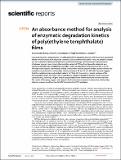An absorbance method for analysis of enzymatic degradation kinetics of poly(ethylene terephthalate) films
Author(s)
Zhong-Johnson, En Ze Linda; Voigt, Christopher A; Sinskey, Anthony J
DownloadPublished version (2.815Mb)
Publisher with Creative Commons License
Publisher with Creative Commons License
Creative Commons Attribution
Terms of use
Metadata
Show full item recordAbstract
Increased interest in poly(ethylene terephthalate) (PET)-degrading enzymes (PETases) have generated efforts to find mutants with improved catalytic activity and thermostability. Here, we present a simple and fast method to determine relative enzyme kinetics through bulk absorbance measurements of released products over time. A thermostable variant of PETase from Ideonella sakaiensis was engineered (R280A S121E D186H N233C S282C) with a denaturation temperature of 69.4 ± 0.3 °C. This was used to assess the method’s ability to determine relative enzyme kinetics across variants and reveal structure–function relationships. Measurements at 24 and 72 h at 400 nM of enzyme suggest that the mutations improved catalytic rates 5- to 7-fold. On the contrary, kinetic analyses of the thermostable variant and wild-type reveal different reaction trajectories despite similar maximum catalytic rates, resulting in higher product accumulation from the thermostable variant over time. The results of the assay support the necessity for kinetic measurements to determine relationships between sequence and function for IsPETase and other PET hydrolases.
Date issued
2021Department
Massachusetts Institute of Technology. Department of Biological Engineering; Massachusetts Institute of Technology. Department of BiologyJournal
Scientific Reports
Publisher
Springer Science and Business Media LLC